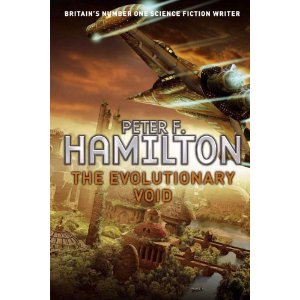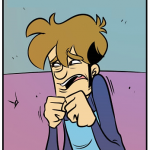 I picked up The Evolutionary Void by Peter F Hamilton with some trepidation. When it comes to reviewing the final book in a series it’s usually a hard job. The expectation that’s built up is difficult to deal with pragmatically. The longer the series, the more of a let down the ending can often be.
I picked up The Evolutionary Void by Peter F Hamilton with some trepidation. When it comes to reviewing the final book in a series it’s usually a hard job. The expectation that’s built up is difficult to deal with pragmatically. The longer the series, the more of a let down the ending can often be.That was certainly the case with Hamilton’s Judas Unchained and to a lesser degree the Naked God, which suffered a deus ex machina that was just a bit of a cop out.
Part of the problem is a well plotted story and well realised characters always leave you wanting more. Good action sequences throughout the book leave the reader wanting a climax that is a good or better than what has gone before. It’s certainly a problem Stephen King has wrestled with- far too many of his books are excellent right up to the supernatural explosion of silliness at the end.
So the question I approached the Evolutionary Void with was can Hamilton write a book that brings things to a satisfactory conclusion without the need for a McGuffin or something that seems too out of place?
There were of course plenty of other questions; where Nigel and Ozzie going to appear? What was the role of the SI, would the deterrent fleet be super awesome, which one of the characters we knew would be the Lady in the void and so on and so forth.
Some of the questions were answered, some were answered satisfactorily and one or two had no answer- I expect to see a separate series charting the Sheldon dynasties adventures in another galaxy at some point in the future for example.
It’s been a couple of days since I finished the Evolutionary Void and I’ve been mulling the experience of it over in my head. I like the concept of the Commonwealth. I liked the wormhole based universe of the first two books (Pandora’s Star and Judas Unchained) as much as I hated the last 100 pages and that seems to be what’s missing in this series. The advent of hyper and ultra drive ships has in many senses robbed this universe of the thing that made it more unique that a lot of other science fiction. Characters ping around in high tech space ships with different shielding systems and different speed capabilities in a way that’s almost too computer gamey at times. There is nothing of the differentiation that was apparent in the Nights Dawn trilogy with Voidhawks and normal human ships with their combat wasp weapon systems.
It does all descend into the realm of Star Trek at one point too. The use of replicators is probably the most disappointing aspect of the book. Need your shields upgraded to deal the the photosphere of a sun? Programme the replicators to make the changes. It’s at best weak and at worst a break in the cohesion of the universe.
There are some big reveals that are really well done though (I’ll save these for a spoiler post in a couple of weeks time that will go into a lot more detail) and overall the pacing is a lot better than Judas Unchained. The improved pacing is probably down to an extra volume in this series.
What Hamilton does well is keep the reader on their toes. There are several threads that give the reader the option to speculate on what is going to happen- the Accelerator faction are working hard, the Navy is readying its deterrent fleet, Gore is plotting, Oscar has a team ready, Paula Myo is wondering what the Cat is up to, just who the heck is Aaron and does it matter, Marius and Trobulum have some role to play too. And of course Justine is already in the void itself. Underlying the whole power play in which the universe is at stake is the rather philosophical concept of human evolution. In this instance its the evolution to what is referred to as the post physical, beings of energy, but it does get you thinking on a wider scale too.
It’s a brave book as Hamilton takes his science fiction into the realms of Arthur C Clarke’s 3rd Law: “Any sufficiently advanced technology is indistinguishable from magic”, there isn’t as much description of orbital status, Largrange points, and the like as there has been in previous books and things like the deterrent fleet are basically so advanced they might as well be magic. Perhaps it is the Edeard sequences effectively having a “magic” element that make this less jarring than it should have been.
It’s difficult to say more without giving the game away too much but overall it’s a good conclusion to a good series. Some characters are wasted a bit, the universe isn’t quite as interesting as it was in the previous series but I left the book and series feeling very satisfied.


